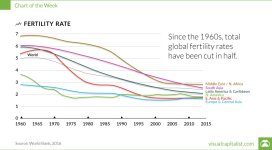I am having a hard time parsing this out. I am not sure that I understand what you are trying to say.
I am not sure how you arrived at inflation suppressing wages. Inflation is an economy wide increase in prices and it erodes the value of the wages and puts pressure on employers to raise wages. If you can get to inflation suppressing wages from this I really don't see it.
Constant nominal wages + inflation = lower real wages.
I think that you are confusing cause and effect.
For every retiree who consumes goods and services, someone has to produce those goods and services and be recompensed with less than the value of the goods and services produced after all deductions. Else, there wouldn't be any goods and services left after the workers have consumed their shares. Whether they get the money on hand but pay hefty rates to social security, or whether they don't see the money in the first place because their bosses have to pay hefty dividends to the fund that owns the company is, in effect, hardly relevant.
Once again, I had to read this over many times to try to find out where you go off of the rails with this. Intentional or not, this demonstrates an anti-capitalistic understanding of the economy. A capitalistic economy expands as necessary to accommodate spending, if there are adequate resources and time to react.
You are contradicting yourself here. We're talking about a scenario where the rate of people in employment falls steadily and significantly, remember? If labour is not a scarce resource with a potential to limit the expansion of the economy, then what's your problem in the first place? If it is, then the economy will
not be able to expand "as necessary to accommodate spending" and thus the goods available will shrink no matter how the retirees get their budget.
Oh, and there's nothing anti-capitalistic about this (though I may or may not be an anti-capitalist at other times). I'm pretty sure I could quote you some Adam Smith saying more or less the same thing if I had the time to look him up.
It doesn't matter if it is a retiree who spends the money or a productive worker. They count the same to direct the economy what and how much to produce. The consumption of the retirees doesn't limit the price or availability of goods for anyone.
It does if labour is a scarce resource, which is an unspoken assumption of yours when you claim that a healthy rate of workers/total population is necessary or desirable
per se.
It's a logical necessity that, if people consume who do not produce, those who produce will have to produce more than they're consuming.
Of course.
This fact is independent of whether the system that allocates the non-producers their share of the production is called and investment bank and the rates dividends, or whether it's called social security and intergenerational transfer.
I read this as:
This fact is independent of what the system that allocates the non-producers their share of the production is called, and investment bank and the rates dividends, or whether it's called social security and intergenerational transfer.
I couldn't make any sense out of the struck out phrase.
What I'm saying is it doesn't matter
how retirees get their budget, as long as you rule out significant leaps in productivity (which implicitly you do), their spending will tighten the market such that whatever a worker takes home after all deductions will buy him less than it would in a world with no retirees.
It *really* doesn't matter at all. Assuming the same level of productivity, the same ratio of retirees, the same living standard of retirees, and the same rate of re-investment, the average worker's take home pay will be the same in real terms no matter how the retiree gets his budget, even if its by digging out a cache of cash.
Now, that is assuming one not necessarily realistic assumption: no significant increases in productivity - but that's an assumption without which your entire argument falls apart, so I'm doing you a favour here.
It is independent even of whether you live under capitalism, communism, feudalism, or some other economic system yet to be conceived. The effect on the working population can only be alleviated by either a) high productivity, or b) a high share of workers among the total population.
If you are talking about the burden being greater on the workers as the number of retirees increases relative to the number of the workers, you are right, but it is not because the production that they consume drives the prices down or wages go down due to inflation but because the retirees are supported with taxes that have to be higher with fewer workers since the taxes are payroll taxes based on wages times the number of workers.
Incorrect. Payroll taxes are
one way to distribute access to goods and services,
one way to make it so that those we no longer expect to contribute to society's production can still benefit from it. But given a certain mode of production, degree of automation etc., any other system of distribution has the same effect of decreasing the amount of goods and services available to the workers. All that counts is the ratio of consumables produced to consumers, or as long as production requires human labor (at a given level of productivity), the ratio of workers to consumers.

